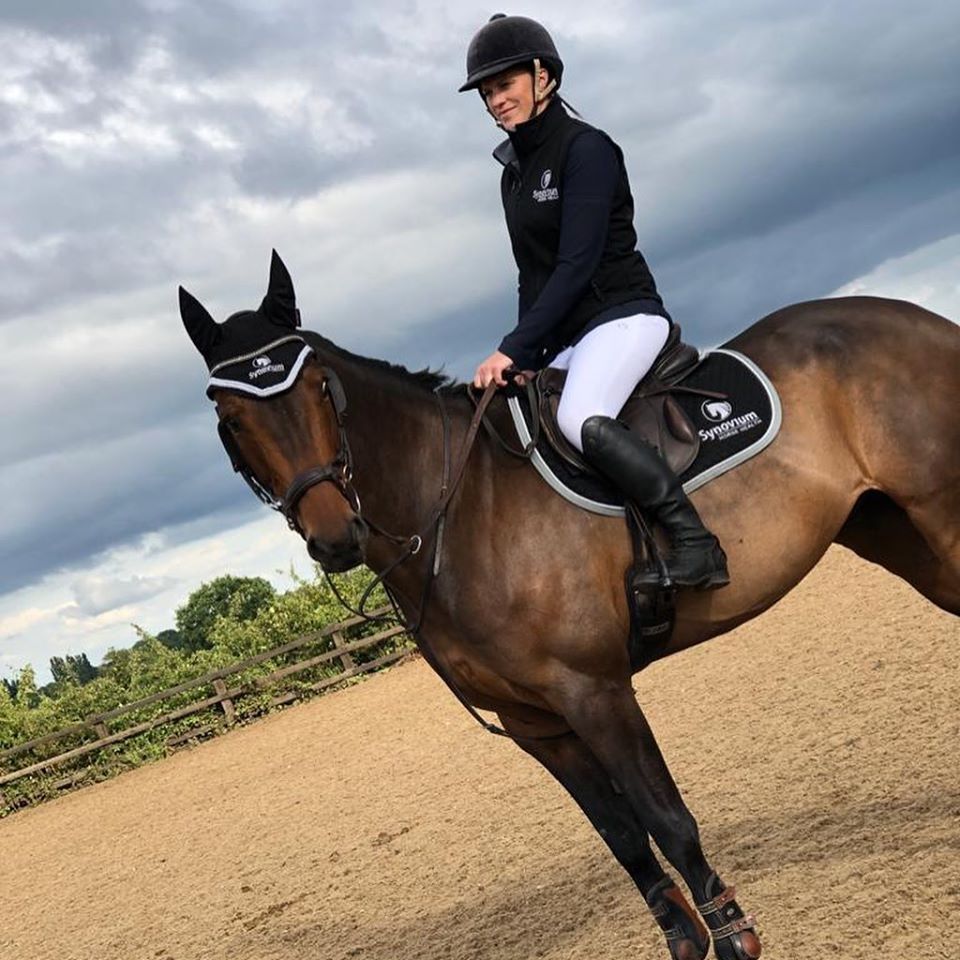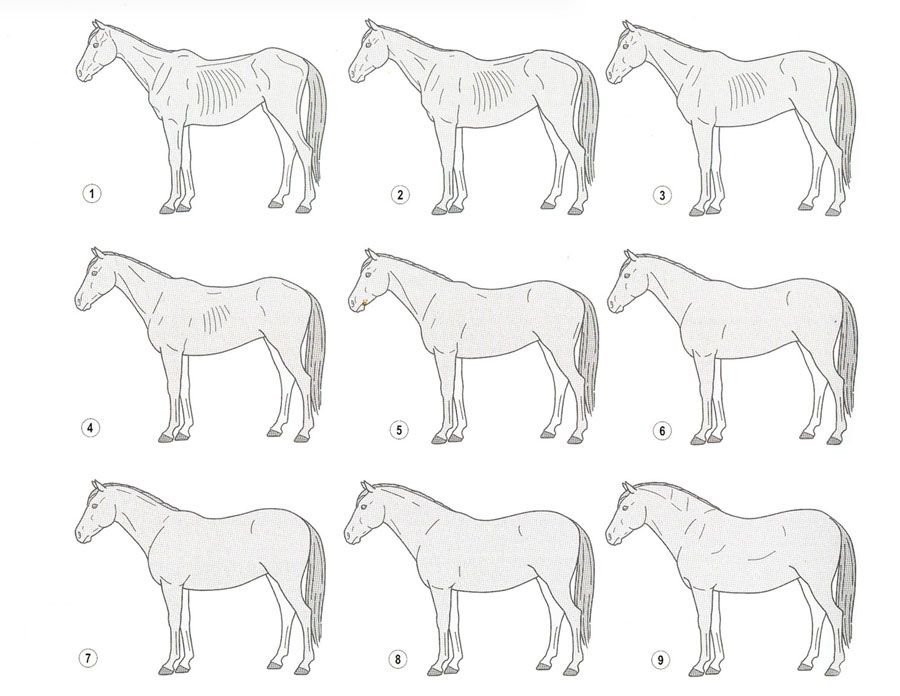The body weight of the horse significantly impacts their performance, health, and overall well-being. Maintaining a healthy body weight mainly relies on suitable nutrition. A diet that exceeds or fails to meet the horse’s daily needs subsequently leads to being overweight or underweight. Therefore, It is essential to regularly monitor the horse’s body weight and adjust the diet when necessary.
An appropriate diet is formulated based on the daily nutrient requirements of the horse, which usually vary between each individual horse.
Requirements rely on factors such as the horse’s age, overall health, current body weight and the intensity of the daily exercise 1.

One of the most important nutrients derived from the diet is energy. Energy is required for body maintenance, several important metabolic processes and provides the body with fuel during exercise. When the horse’s daily needs are met by feeding a tailored diet, the horse’s body weight will remain stable.
However, a diet that consistently exceeds or fails to meet daily requirements will result in the horse becoming overweight or underweight.
Too much energy derived from feed will be converted into fat which is stored in body tissue, causing weight gain. When the horse does not receive enough energy to meet the body’s needs, the horse will use energy reserves stored in the body, which will eventually cause the horse to lose weight.
If the horse loses a lot of weight for a prolonged period, this can result in the horse becoming underweight.
Because weighing the horse regularly by using a scale is impractical, their weight is estimated by using the Body Condition Score (BCS). Using a 9-point system, the horse’s body weight can be estimated 4. Regularly estimating and monitoring the BCS provides insight into the overall health of the horse and the amount of energy provided to the horse through the diet.
A high BCS indicates that the diet contains too much energy and exceeds the requirements of the horse.
Conversely, a low BCS indicates that the diet provides too little energy. A BCS between 4 and 6 is considered an ideal score for an adult (sports) horse.
Based on the results and information from monitoring the BCS, adjustments can be made regarding the horse’s management to optimise the horse’s well-being and performance. Since the requirements differ for each individual horse, it is important to adapt the management to the individual. A horse with a higher BCS score requires different management in comparison to a lower BCS score.

Management of an Underweight Horse
Underweight or weight loss in horses can be caused by various underlying medical issues 3. Therefore, if the horse loses a lot of weight in a short period even if the diet meets the horse’s requirements, it is important to have the horse checked by a vet. However, there are also healthy horses with a fast-working metabolism that have difficulty gaining weight or maintaining it. Horses with a fast-working metabolism burn the energy, provided through the diet, quickly. As mentioned earlier, energy is required for maintaining body weight 1. Therefore, enough energy should be provided through the diet to meet the increased requirements of horses with a fast-working metabolism to support and maintain their body weight.
Energy is provided through the addition of carbohydrates, fats and proteins to the diet 1. Carbohydrates and fats are the main energy providers in the diet. Proteins are only utilized as an energy source by horses when their diet lacks sufficient carbohydrates and fats to meet their daily energy needs. 6. This also reduces the amount of protein available for muscle development and maintenance.
Carbohydrates are divided into structural and non-structural carbohydrates. Structural carbohydrates, also known as fibre, are derived from roughage such as hay, silage, grass but also beet pulp. Fibre is digested into volatile fatty acids in the horse’s intestines and provides 60-70% of the energy required for physical maintenance and metabolic processes in the body 7. In addition, these fatty acids are important for a well-functioning micro-organism composition in the hindgut 8,9.
For more information on the importance of healthy microbiome composition, I would like to refer you to the article “The Importance of Optimal Gut Health”. Non-structural carbohydrates, or sugars and starches, come from concentrates and provide the horse with a source of energy that is rapidly metabolised in the body 10.
Research suggests that feeding a high-starch diet is not desirable, due to various health issues this may cause.
Therefore, it is important to select nutrients that will provide the required daily amount of energy without adding too many non-structural carbohydrates.
Fats are often supplemented to the horse’s diet to support skin and coat and health. In addition to this supporting function, fats are energy-dense nutrients 11. Linseed oil is a product often used to supplement necessary fats to the diet because it is a plant-based product and contains the ideal balance of Omega 3 and Omega 6 fatty acids.
Therefore, this product is an ideal supplement and source of energy for horses that struggle to maintain their weight, without the excessive addition of sugar and starch.
Managing an Overweight Horse
Excess weight in horses is linked to health problems such as insulin resistance, laminitis and Equine Metabolic Syndrome (EMS) 12.
As mentioned earlier, excess weight in horses occurs when the diet exceeds the horse’s requirements. Excess energy that the horse does not use will eventually be stored as body fat 2.
To prevent health problems and optimise well-being and performance, diet adjustments should be made to reduce the amount of available energy. However, it is important to introduce dietary changes gradually because the digestive system, especially the microbiome in the hindgut, is very sensitive to sudden dietary changes 13. In addition, it is always important that the diet meets the horse’s vitamin and mineral needs.
Concentrated feed is fed to horses to provide necessary vitamins and minerals. Besides, feeding concentrates provide an extra energy source to horses performing intensive activity 14.
Ensuring that a horse’s diet is in line with their level of physical activity is crucial in preventing weight gain due to a lack of exercise and an excess of concentrates in their diet. Therefore, it is important to monitor the energy intake of the horse through the diet in comparison to the intensity of the physical activity they perform.
Horses with little or no physical exertion require less or even no concentrates to meet energy requirements and, for these horses, a vitamin and mineral supplement, in addition to the necessary roughage, is sufficient to meet the horse’s needs.
Roughage is important for the health of the equine hindgut and microbiome composition 8,9. Horses naturally eat small portions of roughage throughout the day because the horse’s digestive system is unable to digest large portions at once 15.
There are various types of roughage, and the amount of available energy varies between them. To address the needs of overweight horses or those that tend to gain weight easily, it is recommended to opt for a type of roughage that is low in energy but still supplies enough fibre to maintain a balanced microbiome.
Moreover, this type of roughage can often be fed in small portions throughout the day to prevent digestive problems such as stomach ulcers.
By implementing strip grazing, the horse’s access to grass is restricted to a certain amount 16. Especially when the grass is rich in sugar, this is a helpful method to regulate and reduce the amount of available energy from the diet 16. To ensure adequate outdoor time for the horse, consider turning them out in a sand paddock with a hay rack or net filled with low-energy roughage. This can assist in fulfilling their necessities, without overfeeding and ensuring their overall well-being.
Proper exercise is just as important as a healthy diet for a horse to lose weight. Exercise assists in burning excess energy and losing weight 17.
In summary, to ensure a horse’s optimal health, well-being, and performance, it is important to first rule out any medical issues if they are overweight or underweight. A veterinarian and nutritionist can provide support, and advice and can help formulate an appropriate diet to achieve this goal.


